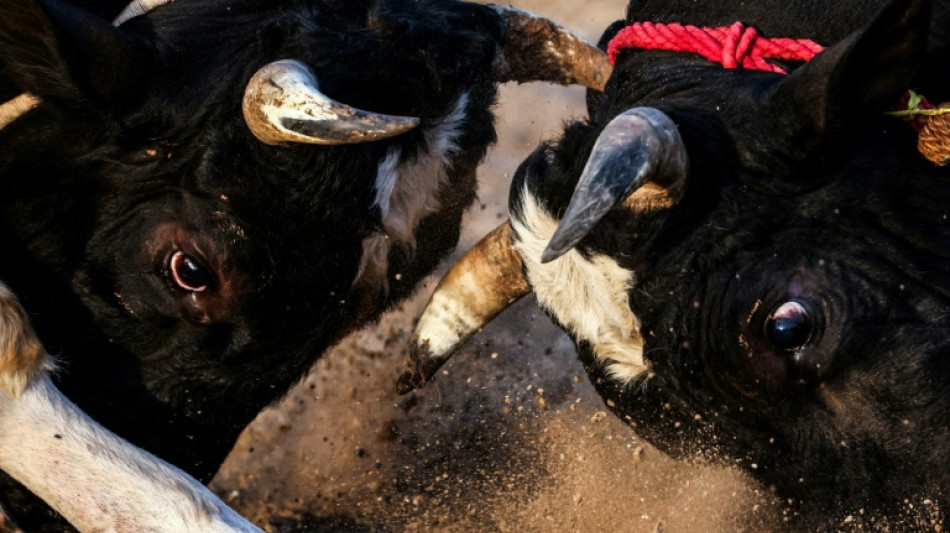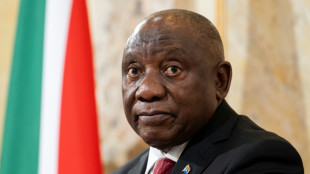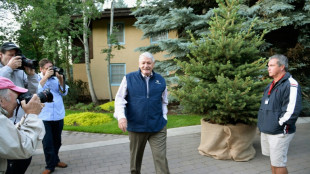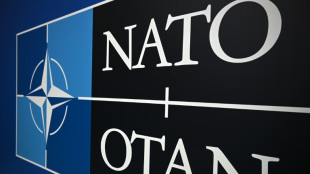
-
 Dollar rises after Fed chair says December rate cut not a given
Dollar rises after Fed chair says December rate cut not a given
-
Google parent Alphabet posts first $100 bn quarter as AI drives growth

-
 Rob Jetten: ex-athlete setting the pace in Dutch politics
Rob Jetten: ex-athlete setting the pace in Dutch politics
-
Juve bounce back after Tudor sacking as Roma keep pace with leaders Napoli

-
 Favorite Sovereignty scratched from Breeders' Cup Classic after fever
Favorite Sovereignty scratched from Breeders' Cup Classic after fever
-
Doue injured as PSG held at Lorient in Ligue 1

-
 Leverkusen win late in German Cup, Stuttgart progress
Leverkusen win late in German Cup, Stuttgart progress
-
Jihadist fuel blockade makes life a struggle in Mali's capital

-
 Uber plans San Francisco robotaxis in Waymo challenge
Uber plans San Francisco robotaxis in Waymo challenge
-
Paramilitary chief vows united Sudan as his forces are accused of mass killings

-
 Trump, Xi to meet seeking truce in damaging trade war
Trump, Xi to meet seeking truce in damaging trade war
-
Over 100 killed in Rio police crackdown on powerful narco gang

-
 Divided US Fed backs second quarter-point rate cut of 2025
Divided US Fed backs second quarter-point rate cut of 2025
-
'Amazing' feeling for Rees-Zammit on Wales return after NFL adventure

-
 'Cruel' police raids help, not hinder, Rio's criminal gangs: expert
'Cruel' police raids help, not hinder, Rio's criminal gangs: expert
-
S. African president eyes better US tariff deal 'soon'

-
 Sinner cruises in Paris Masters opener, Zverev keeps title defence alive
Sinner cruises in Paris Masters opener, Zverev keeps title defence alive
-
Winter Olympics - 100 days to go to 'unforgettable Games'

-
 Kiwi Plumtree to step down as Sharks head coach
Kiwi Plumtree to step down as Sharks head coach
-
France to charge Louvre heist suspects with theft and conspiracy

-
 US media mogul John Malone to step down as head of business empire
US media mogul John Malone to step down as head of business empire
-
'Never been this bad': Jamaica surveys ruins in hurricane's wake

-
 France adopts consent-based rape law
France adopts consent-based rape law
-
Zverev survives scare to kickstart Paris Masters title defence

-
 Rabat to host 2026 African World Cup play-offs
Rabat to host 2026 African World Cup play-offs
-
Wolvaardt-inspired South Africa crush England to reach Women's World Cup final

-
 US says not withdrawing from Europe after troops cut
US says not withdrawing from Europe after troops cut
-
WHO urges Sudan ceasefire after alleged massacres in El-Fasher

-
 Under-fire UK govt deports migrant sex offender with £500
Under-fire UK govt deports migrant sex offender with £500
-
AI chip giant Nvidia becomes world's first $5 trillion company

-
 Arsenal depth fuels Saka's belief in Premier League title charge
Arsenal depth fuels Saka's belief in Premier League title charge
-
Startup Character.AI to ban direct chat for minors after teen suicide

-
 132 killed in massive Rio police crackdown on gang: public defender
132 killed in massive Rio police crackdown on gang: public defender
-
Pedri joins growing Barcelona sickbay

-
 Zambia and former Chelsea manager Grant part ways
Zambia and former Chelsea manager Grant part ways
-
Russia sends teen who performed anti-war songs back to jail

-
 Caribbean reels from hurricane as homes, streets destroyed
Caribbean reels from hurricane as homes, streets destroyed
-
Boeing reports $5.4-bn loss on large hit from 777X aircraft delays

-
 Real Madrid's Vinicius says sorry for Clasico substitution huff
Real Madrid's Vinicius says sorry for Clasico substitution huff
-
Dutch vote in snap election seen as test for Europe's far-right

-
 Jihadist fuel blockade makes daily life a struggle for Bamako residents
Jihadist fuel blockade makes daily life a struggle for Bamako residents
-
De Bruyne goes under the knife for hamstring injury

-
 Wolvaardt's 169 fires South Africa to 319-7 in World Cup semis
Wolvaardt's 169 fires South Africa to 319-7 in World Cup semis
-
EU seeks 'urgent solutions' with China over chipmaker Nexperia

-
 Paris prosecutor promises update in Louvre heist probe
Paris prosecutor promises update in Louvre heist probe
-
Funds for climate adaptation 'lifeline' far off track: UN

-
 Record Vietnam rains kill seven and flood 100,000 homes
Record Vietnam rains kill seven and flood 100,000 homes
-
Markets extend record run as trade dominates

-
 Sudan govt accuses RSF of attacking mosques in El-Fasher takeover
Sudan govt accuses RSF of attacking mosques in El-Fasher takeover
-
Rain washes out 1st Australia-India T20 match


Little-known bullfighting tradition lives on in UAE village
Far from Dubai's gleaming skyscrapers and renowned camel races, a bullfight is under way in the emirate of Fujairah, where the tradition continues unbeknown to most in the United Arab Emirates.
"Look at them fight!" a commentator shouts into a microphone as the first bovine battle of the day kicks off, sending up clouds of dust in the village of Al-Qurayyah.
Two bulls, each weighing in at hundreds of kilograms (pounds), charge at each other while assistants hold ropes attached to their necks or legs for safety.
Sometimes the huge animals come dangerously close to the spectators, sending them fleeing from their chairs.
About 200 men, women and children are gathered in a large field to watch, with children perched on the roofs of 4X4 vehicles and pick-ups.
Trucks carrying bulls have converged from all over the region on the arena, a dirt field wedged between rocky mountains and the Gulf of Oman.
About 50 of the beasts are scattered around, and their bellowing echoes across the area.
"There are no rules," explained Issa, 34, whose family owns a nearby farm and has been involved in bullfighting for decades.
"The winner is the one that shows the most courage and doesn't run away," added the man whose nephews stream the bouts on TikTok and Instagram.
In the better-known emirates of Abu Dhabi and Dubai, camel beauty contests and races are popular, but "here it is the bullfights", said Majid, 36, whose animal scored a draw in the fight.
- Cruel and abusive? -
Unlike the bullfights popular in Spain and Mexico, where the animals are typically slain by matadors, in Fujairah two beasts go head-to-head with far less fatal consequences.
The competition typically ends after about an hour, with each fight lasting just one or two minutes.
Animal welfare groups have however denounced the sport as cruel and abusive.
Elsayed Mohamed, the regional director of the International Fund for Animal Welfare, argued that just because something has been part of a society for so long does not make it right.
"Every culture has many bad traditions, but because it's a tradition, we have to follow?" he asked, noting that animal fights are prohibited under UAE law.
Those who promote the fights, he said, argue that "it is 'not a bloody' competition... comparing these fights to the ones in Spain that end with the killing of the animal.
"Even if they are taking precautions to prevent any harm, wounds will happen," said Mohamed.
Standing in the audience at the recent bullfight event was a German tourist couple who had learnt about it in an "alternative tourist guide book".
"We thought it would be interesting to see that -- it's unusual for us," said Gunter Beelitz, who works in theatre.
"This is a bit like the fights in Spain except that here it is just one bull against one bull and not a man," he said. "And the bull doesn't die. We don't like the Spanish bullfights."
- Family tradition -
The bulls were once imported from South Asia for agricultural work, but the emergence of new technologies has rendered them obsolete to farming.
Issa's family breed the animals or buy them for between 5,000 and 40,000 dirhams (about $1,360 to $10,900).
With help from a number of farm employees he readied about 17 beasts to fight every Friday after prayers.
He said he has been preparing bulls for battle since he was "just a child".
"We go to the animals, we check if they are okay... we take their temperatures and we feed them," he said.
He rolled up his sleeves and dipped his arm into a large pot of bovine powerfood -- a boiled mixture of wheat, dates, herbs and fish.
"This is what gives the bulls their strength," said Issa, clad in a traditional Emirati "kandoura", an ankle-length shirt.
Issa and his family said they have no intention of ending the pastime that has been passed down from generation to generation.
"People did not have much to do, and they would get the animals and get them to fight, a form of entertainment," said Issa.
"It would bring people together," he continued, adding that he plans to pass the practice down to his six children.
J.AbuHassan--SF-PST

